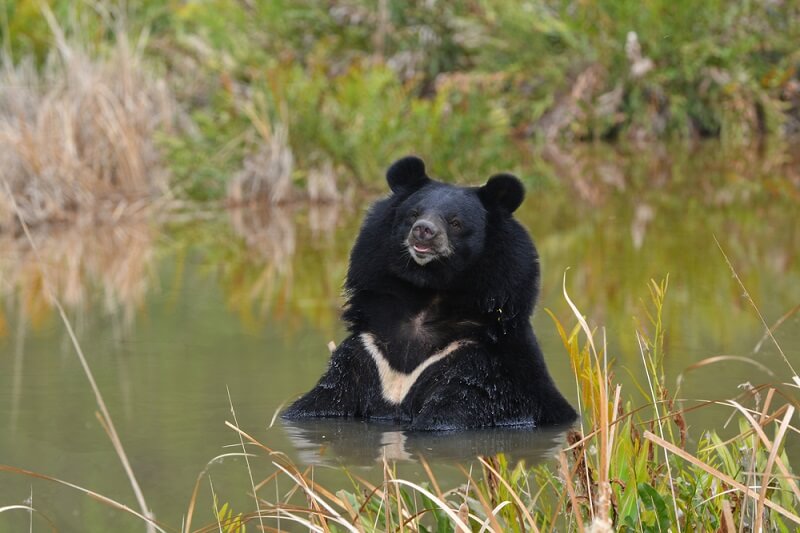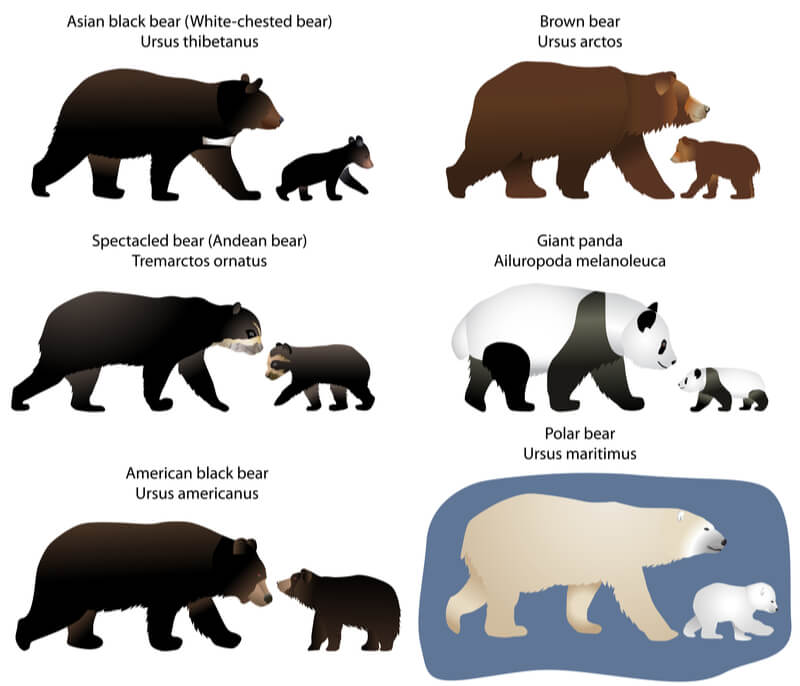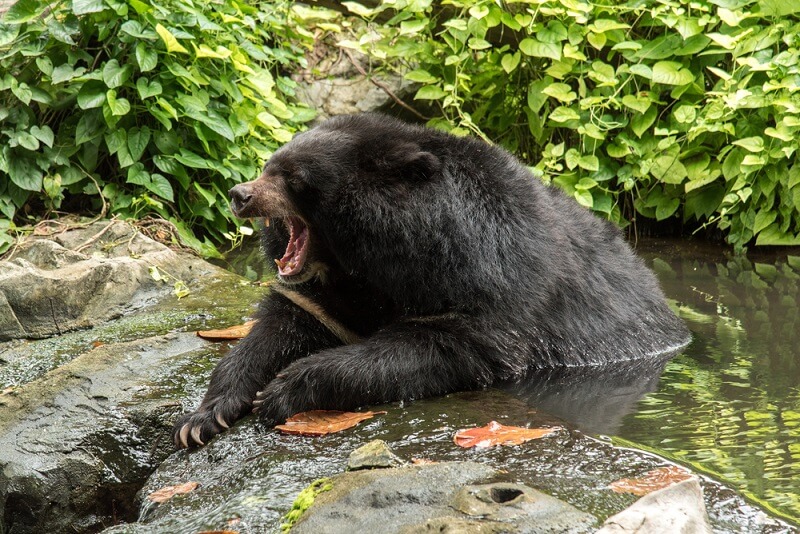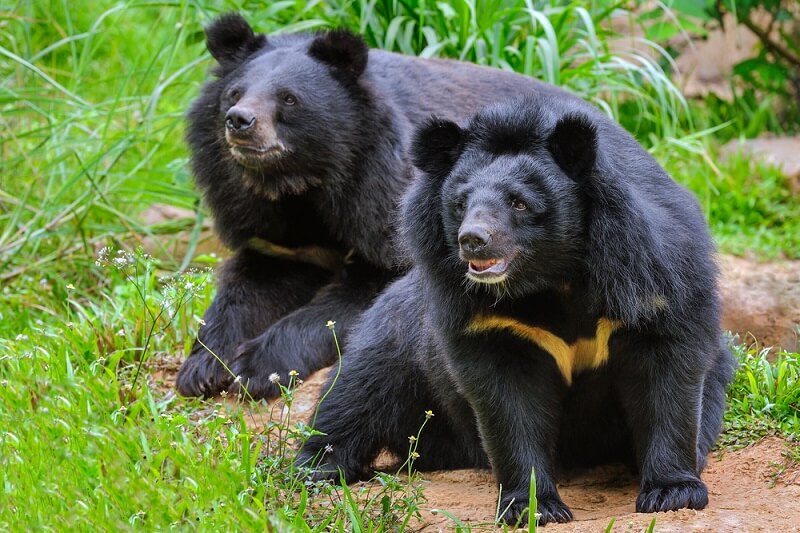
| Kingdom | Animalia |
| Phylum | Chordata |
| Class | Mammalia |
| Order | Carnivora |
| Family | Ursidae |
| Genus | Ursus |
| Species | Ursus thibetanus |
| Niche | Omnivorous Scavenger |
| Length | 45-75 in (.7-1 m) |
| Weight | 88-440 lbs (40-200 kg) |
| Lifespan | About 25 years |
| Social Structure | Solitary |
| Conservation Status | Vulnerable |
| Preferred Habitat | Deciduous Forests, Grasslands, Wetlands |
| Average Litter Size | 2 with a range of 1-4 |
| Main Prey Species | Insects, plants, carrion, fruits, nuts, seeds |
| Predators | Humans, tigers, brown bears |
The Basics
Moon bears, also known as Asian Black Bears or White-chested Bears, are a species that is mostly herbivorous and lives in deciduous forest, grasslands, and wetlands at elevations around 11,000 feet across Asia. This bear is very similar to its cousin, the American Black Bear, though it is slightly more nimble and has a distinctive white patch on its chest.
Like American black bears, the Asian moon bears will feed on everything from insect larvae to plants and mushrooms to human garbage. Though groups of mothers and their offspring can sometimes be found, the moon bear is a largely solitary creature – preferring to scavenge on its own.

Unfortunately, this leads moon bears into quite a bit of conflict with humans. On average, several people are attacked and mauled by moon bears every year. Several naturalists have also posited that the moon bear is more aggressive than its American cousin.
They hypothesize that because the moon bear shares territory with tigers, it must be more aggressive to survive. This often leads to attacks on humans and subsequent revenge killings of moon bears. Moon bears also have poor vision, which may allow them to get spooked and attack more readily.
Moon bears have a high consumer demand because of their supposed healing properties within the framework of Traditional Chinese Medicine. Though none of these supposed properties have been confirmed by modern science, the demand for moon bear parts drives a continual effort to poach these vulnerable animals. Other threats, such as land conversion for agriculture, dams, other habitat destruction, and a decreasing population is keeping the moon bear in a delicate position.

Interesting Insights from the Moon Bear!
Like all of the animals that we profile, the moon bear displays some truly fascinating biological concepts that are important to understand. Of these, conservation behavior, wild animal markets, and human-wildlife interactions are the most important!
Conservation Behavior
Conservation Behavior is a relatively new field of zoology that involves studying animal behaviors to aid in their conservation. The moon bear provides an excellent example of why this is so important. One of the main threats facing moon bears is human encroachment and poaching. Not surprisingly, many other large animals face similar persecution.
Conservation behavior aims to study behaviors that lead to conflict – such as the moon bear’s desire to scavenge through human garbage and crops – and tries to turn them into opportunities to protect the bears. For instance, conservation behaviorists may try to encourage farmers to plant a “protective” crop around their fields that repels bears to other territories. Other strategies might include discouraging moon bears through loud noises, strong repellent scents, or other means that fit naturally with moon bear behavior.
Wild Animal Markets
Moon bears are sought in many countries for various reasons. Some believe that moon bear bile has healing properties, while others covet moon bear paws and revere them as sacred. Since moon bears are readily trainable in the right setting, cubs are also desired as pets and carnival attractions.

On one hand, wild animal markets across Asia feed and support many local communities. However, as the population grows, so does the demand for rare products and live animals. Eventually, consuming animals from wild sources leads to the destruction of wild places and the extinction of animals – as humanity has already witnessed multiple times.
While the solution to wild animal markets will have to be complex to support the needs of local communities, it will also have to protect humanity from potential zoonotic diseases that often originate in these markets, and protect wild animals from over-exploitation and extinction.
Human-Wildlife Interactions
Like many other large animals in the order Carnivora, the moon bear is often persecuted for attacking humans. While it is a tragedy that humans get attacked, this is also a wild animal that deserves respect and space.
Human-wildlife interactions that are negative typically lead to a more negative public opinion of a particular animal. This is true even if the animal has done much less harm to humanity than some of our own inventions – airplanes, for instance. In cases where livestock or humans are attacked by an animal, public opinion changes quickly.
For example, the United States has tried to reintroduce wolves and other predators to Yellowstone National Park. This effort has been met by strong resistance from local farmers trying to protect their livestock. While evidence shows that as long as wolves have access to a wild source of food they will avoid livestock, ranchers are understandably scared for their livelihood. This leads to conservation solutions that are difficult to implement in certain areas – something that will likely prove true for the moon bear, as well.
